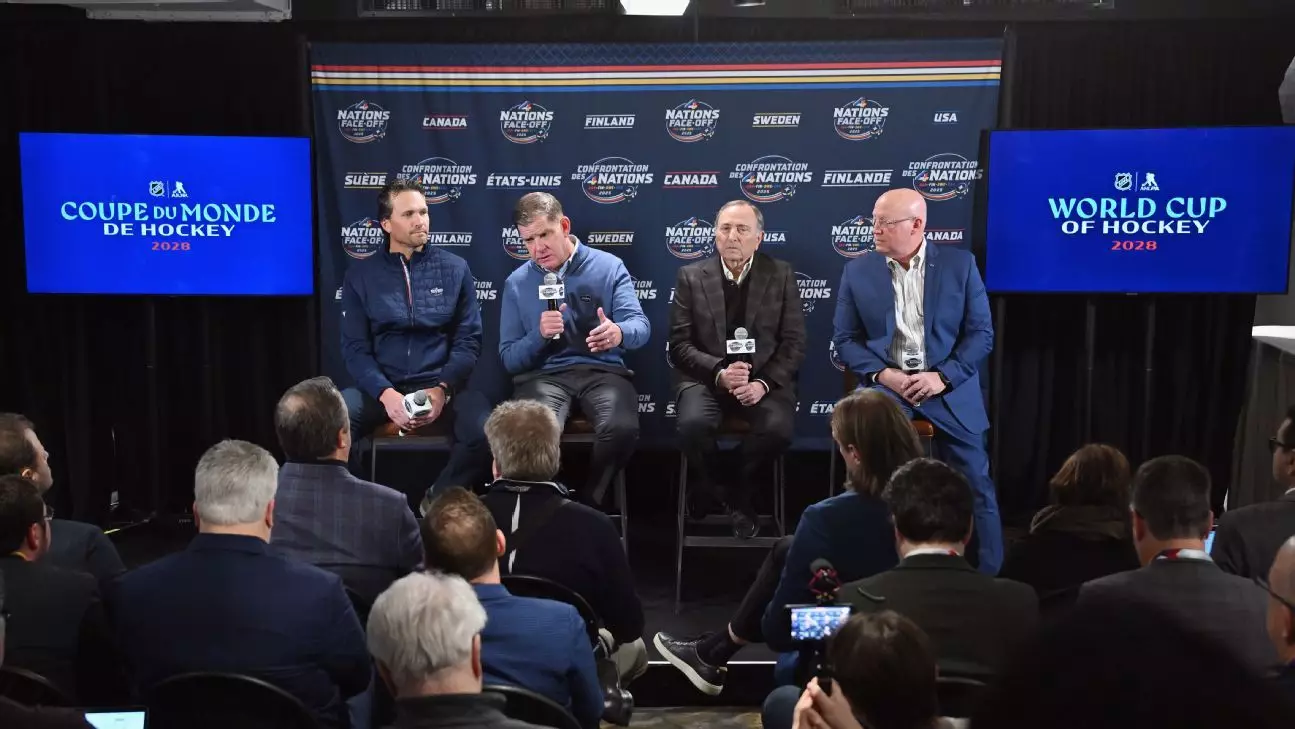In a significant announcement made from Montreal, NHL commissioner Gary Bettman confirmed that the World Cup of Hockey will make its much-anticipated return in February 2028. This development marks an exciting chapter not just for fans of the NHL, but for hockey enthusiasts around the globe. Joining Bettman in this declaration was Marty Walsh, executive director of the NHL Players’ Association (NHLPA), who emphasized a shared commitment to reintegrating NHL players into international competitions, notably at the upcoming 2026 Winter Olympics in Milan.
With the introduction of a regular schedule for international hockey, fans can look forward to high-stakes competition featuring the world’s elite players. Bettman referred to the imminent 4 Nations Face-Off—a showcase featuring teams from the USA, Canada, Finland, and Sweden—as a “sampler” of what might come. The NHL players’ last Olympic appearance was back in 2014, and the last World Cup was held in 2016, leaving a considerable gap in the opportunity for top athletes to display their talents on an international stage.
The importance of this return to global competition cannot be overstated, especially as players like Connor McDavid and Auston Matthews have continuously voiced their aspirations to compete for their countries. Bettman’s excitement about the prospects of these tournaments was palpable when he stated, “We couldn’t be more excited about making a reality: Olympics, World Cups, Olympics, World Cups on a regular schedule of the best hockey players in the world representing their countries.” This sentiment reflects a shared desire among players and fans alike for a consistent platform allowing for pinnacle-level matchups.
As the framework for the World Cup of Hockey begins to take shape, Bettman announced that bids for potential host locations will soon be accepted. He mentioned the possibility of incorporating European cities, which could add an exhilarating element to the format. While the precise structure of the tournament remains undecided, there is a firm expectation for at least eight national teams to participate.
What stands out here is the change in composition from previous tournaments. The 2016 event allowed for “melding teams” like Team Europe and a U-23 North American roster. In contrast, the upcoming tournament will see traditional national representations, which not only honors the sport’s rich history but also heightens national pride and rivalry.
The absence of the International Ice Hockey Federation (IIHF) in this tournament further distinguishes it from past events. By limiting participation to NHL players alone and excluding those from European leagues, the league reinforces its brand’s exclusivity, but this also raises questions about fairness and diversity in the global hockey landscape.
A significant hurdle looms over the tournament’s prospects: the participation of Russian players. Since Russia’s invasion of Ukraine in 2022, it has been barred from international competition. Both Bettman and Walsh acknowledged the political complexities that have led to this situation. Walsh expressed a desire for Russian athletes to return to international play but underscored that the barriers to their participation are rooted in broader political issues rather than opposition from within the NHLPA.
The NHL and IIHF extended the ban through the 2025-26 season, which raises concerns about whether the situation will improve in time for the upcoming events. Deputy commissioner Bill Daly’s comments also suggest that substantial changes must occur for the NHL to reassess its stance on Russian players. The dialogue surrounding this issue is crucial, reflecting the intertwined nature of politics and sports on the world stage.
Amid these exciting developments, another noteworthy aspect of this announcement is the apparent strengthening of the relationship between the NHL and the NHLPA. As they approach negotiations for a new collective bargaining agreement, which is set to expire in September 2026, both Bettman and Walsh expressed optimism. Bettman indicated that the ongoing collaboration has positioned both parties effectively for future international competitions.
With a mutual commitment to excellence and a shared vision for the global stage, it appears that both sides are eager to lay the groundwork for an event that celebrates the best of hockey. Bettman’s mention of Walsh being a transformative presence at the NHLPA suggests an era of cooperative decision-making, potentially leading to enhanced experiences for players and fans alike.
The return of the World Cup of Hockey and the commitment to include NHL players in the Winter Olympics sets the stage for a thrilling resurgence of international competition. As we look ahead to 2028 and beyond, the roadmap laid out will pave the way for one of the most memorable eras in hockey history.

